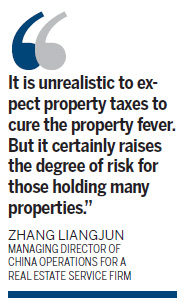China
Shanghai ready to launch tax on properties
By Wang Ying (China Daily)
Updated: 2011-01-14 08:00
 |
Large Medium Small |

Move expected to help reduce pressure on rising prices
SHANGHAI - Shanghai's property tax will target new properties where each member of the family enjoys more than 70 square meters, local officials said.
The tax rate will be set at 0.5 to 0.6 percent of the property's price, China Securities Journal reported on Thursday.
For instance, if a couple paid one million yuan ($151,300) to buy an apartment of more than 140 sq m, which means each occupies more than 70 sq m, they may have to pay a tax of more than 5,000 yuan.
"Among the four cities that proposed property tax plans to the central government, Shanghai and Chongqing will definitely be the first to impose the tax after getting the green light," an unidentified official from the Shanghai development and reform commission was quoted as saying by the newspaper.
The property tax in Chongqing will have little impact on the city's property market, since the southwestern municipality will impose the tax on high-end properties, which account for only 10 percent of the city's total properties.
However, Shanghai's housing market developed earlier and faster than Chongqing's and the wide-ranging tax collection will have an accordingly higher impact.
Shanghai's trial version should be more cautious in order to protect the interests of the middle- and low-income families who inherited their properties from their parents or changed small flats into bigger ones due to the city's grand relocation projects, said the official.
Shanghai proposed three versions of property taxes to the central government and the most promising was the 70-sq-m scheme, while the other two versions were turned down because the measures were too mild, sources close to the local government said.
The measure comes as housing markets in major cities are overheated and some are forming bubbles. Soaring housing prices have not only fueled further speculation and upped the stakes for the banking system, but also widened the gap between the rich and the poor.
Despite efforts by the central and Shanghai governments, average prices for new apartments increased by 10 percent to a new high of 24,200 yuan per sq m as of the end of 2010. Meanwhile, second-hand houses increased by 15.3 percent in the first 11 months of 2010, reaching an average of 17,248 yuan per sq m at the end of November, according to latest statistics from property service consultancy Savills China.
"It is unrealistic to expect property taxes to cure the property fever. But it certainly raises the degree of risk for those holding many properties," said Zhang Liangjun, managing director of China operations with real estate service firm Cushman & Wakefield.
"(Those) holding large properties will pay a sizable tax, and speculation on the housing market will taper off too," said James Macdonald, a senior manager with Savills China.
In the long term, it will readjust the land and property market and make more efficient use of existing stock as well as generate a more efficient allocation of capital, he added.
Chongqing will levy a property tax on existing and newly built high-end commercial residential buildings, Shanghai Securities News reported, citing Chongqing Mayor Huang Qifan.
But Huang did not disclose criteria for defining "high-end," nor did he reveal the tax rate, said the paper.
The paper added the southwestern municipality is likely to impose a 1-percent tax on housing of more than 200 sq m, or valued at three times the average price of a house in the downtown area.
China Daily